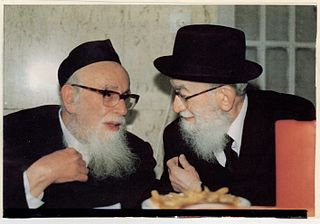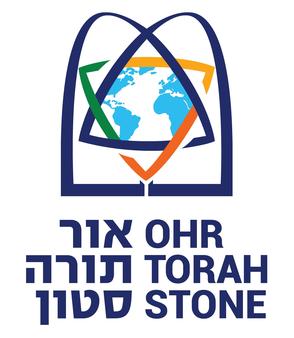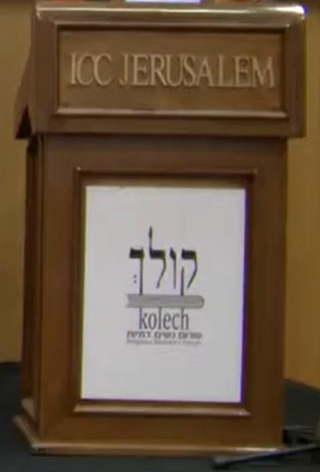
Shlomo Zalman Auerbach was an Orthodox Jewish rabbi, posek, and rosh yeshiva of the Kol Torah yeshiva in Jerusalem. The Jerusalem neighborhood Ramat Shlomo is named after Auerbach.
A Midrasha, typically, is an institute of Torah study for women of post-high-school age, somewhat equivalent to a men's yeshiva; most are located in Israel. The midrasha is also somewhat parallel to a "women's seminary", which functions in a similar form. While the terms may sometimes become interchangeable, "midrashot" are commonly linked to Religious Zionism, while the women's "seminaries" are usually associated with Haredi Judaism.
Jewish feminism is a movement that seeks to make the religious, legal, and social status of Jewish women equal to that of Jewish men in Judaism. Feminist movements, with varying approaches and successes, have opened up within all major branches of the Jewish religion.
The Drisha Institute for Jewish Education is a center for advanced Jewish learning located on the Upper West Side of New York City. Though initially founded to promote advanced scholarship for women, it has since expanded to offer text-based learning for men and women of all ages.

Rabbi Yehuda Herzl Henkin, author of the responsa Benei Banim, was a Religious Zionist and Modern Orthdox posek.

Mayanot Institute of Jewish Studies מעיינות, 'Wellsprings', is an educational Lubavitch Institution in Jerusalem for Jewish students interested in experiencing and deepening their unique bond with the Jewish People and the Land of Israel, for those aged 18–32, with an executive learning option for those aged 32 and over.

Midreshet HaRova is a Religious Zionist Jewish seminary located in the Jewish Quarter of Jerusalem's Old City. The all-female seminary teaches through the lens of emphasizing Aliyah. Amongst the plethora of post-High School seminaries for non-Israelis, the Overseas program is regarded as well rounded, inviting for all levels of learning.
Midreshet Lindenbaum, originally named Michlelet Bruria, is an Open Orthodox midrasha in Talpiot, Jerusalem. It counts among its alumnae many of the teachers at Matan, Nishmat, Pardes and other women's and co-ed yeshivas in Israel and abroad.

Women rabbis and Torah scholars are individual Jewish women who are recognized for their studies of the Jewish religious tradition and often combine their study with rabbinical ordination. Ordination of women has grown since the 1970s with over 1,200 Jewish women receiving formal ordination. The majority of these women are associated with Progressive Jewish denominations. In Orthodox Judaism, the matter of ordination is more complex. Although a significant number of Orthodox women have been ordained as rabbis, many major Orthodox Jewish communities and institutions do not accept the change. In an alternative approach, other Orthodox Jewish institutions train women for various Jewish religious leadership roles and may entail training in Jewish Law although no formal rabbinic ordination is granted. Instead, alternate titles are used. Yet, despite this alteration in title, these women are often perceived as equivalent to ordained rabbis.
WebYeshiva.org is a pioneering online yeshiva and midrasha. It is unique in that its classes are presented live, and are fully interactive, replicating the structure of a traditional shiur. Its offering extends through Semicha. It was founded in November 2007 by Rabbi Chaim Brovender and is directed by Rabbi Jeffrey Saks. WebYeshiva is a project of the Academy for Torah Initiatives and Directions (ATID). It is headquartered on HaNassi St., in Jerusalem, near the President's House.
"Guide for the Halakhic Minyan" is a work published to provide Jewish worship groups, especially Partnership minyans, with halachic sources that support the participation of women in leadership roles in traditional worship services, including the reading from the Sefer Torah, Haftarah, and other special biblical readings, such as the Book of Esther on the Jewish festival of Purim.
A yoetzet halacha, a controversial, recently created position, describing a Jewish woman certified to serve as an advisor to individuals with questions regarding Jewish practices relating to menstruation, associated with the Open Orthodox movement.

Rachelle Sprecher Fraenkel is a Torah educator at Nishmat, The Jeanie Schottenstein Center for Advanced Torah Study for Women, and the director of Matan's Hilkhata Institute at Matan Women's Institute for Torah Studies. She became an international speaker after her son, Naftali Fraenkel, was kidnapped and murdered along with two other Israeli teens in 2014.
David Fink is an Israeli Orthodox rabbi and expert in halacha and Jewish medical ethics.
Yeshivat Maharat is a Jewish educational institution in The Bronx, New York, which is the first Orthodox-affiliated yeshiva in North America to ordain women. The word Maharat is a Hebrew acronym for phrase manhiga hilkhatit rukhanit Toranit, denoting a female "leader of Jewish law spirituality and Torah." Semikha is awarded to graduates after a 3- or 4-year-long program composed of intensive studies of Jewish law, Talmud, Torah, Jewish thought, leadership training, and pastoral counseling. The ordination functions as a credentialed, albeit controversial, pathway for women in the Orthodox Jewish community to serve as clergy members.

Ohr Torah Stone (OTS) is an international Modern Orthodox organization that aims to develop Jewish life, learning, and leadership. The organization is led by Rabbi Kenneth Brander. OTS was founded by Rabbi Shlomo Riskin in 1983. As of 2020, OTS included 27 educational institutions under its auspices.

Kolech, also known as Kolech: Religious Women's Forum, is an Israeli women's organization associated with Orthodox Judaism. The group's stance is aligned with Orthodox Jewish feminism and religious Zionism.

Esti Rosenberg is an American-Israeli Orthodox Rabbanit who is the founder and head of the Migdal Oz seminary. She is the daughter of Rabbi Aharon Lichtenstein and Dr. Tovah Soloveitchik and the granddaughter of Joseph B. Soloveitchik.










